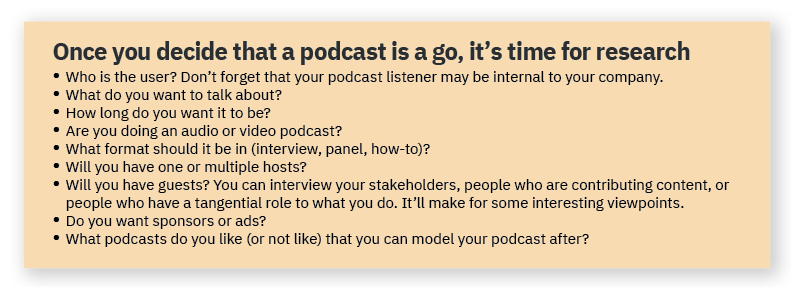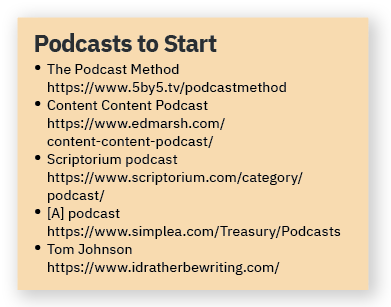By Ed Marsh | STC Associate Fellow
How podcasting can help promote you and your content
In 2022, you have so many more ways and places to reach your audience than the traditional online help, PDF, or website. You can reach people while they’re commuting, at the gym, making dinner, or even cleaning the house. With that in mind, have you considered adding a podcast to your repertoire?
Over the course of this article I’ll tell you why I started a podcast, then explain why your team or your business should consider having a podcast, and what you need to get started. Just remember that the world today is multimedia, and what applies to podcasting in this article can also apply to videos and eLearning.
Why I Created a Podcast
In 2014, I was looking to make a name for myself in the technical communications world. I was also looking for a way to give back to the profession. After writing and editing all day, I knew I didn’t want to come home and write blog posts. I was a journalism major with college radio experience, so I thought a podcast would highlight my interviewing skills. At the time, there weren’t too many tech comm-related podcasts (except Tom Johnson, but that guy’s everywhere). There was opportunity; I did my research and grabbed it. The good news is that it worked. Creating the podcast led to opportunities I expected and several I didn’t.
What’s in It for You?
What can you showcase or market with a podcast? The simple answer is marketing, whether it’s you, your team, or your company. Some things to consider:
- Promoting what you and your team do. People can’t read your docs on the commute to work or during a workout, but they may want to listen to a five- or 10-minute podcast relevant to their job and your product’s role in it.
- Personal promotion. Due to intellectual property laws, many people struggle to share writing samples with potential employers. Podcasting is a terrific way to get yourself and your business out there.
While promotion is the best reason to start, don’t underestimate the fun aspect. I thought putting together a podcast would be interesting, but I’m having more fun than I ever thought I would. I’m full of adrenaline and joy after every episode. For the people I knew prior to recording with them, it gave us an opportunity to get to know each other better and learn more than you normally would in five or 10 minutes of conversation in passing between conference sessions. That said, some of my best episodes are with people I didn’t know until recording the podcast. This is the fun of podcasting and even more reason to be prepared so you can go off-script, really get to know someone, and create an engaging podcast.
Add Value
Scriptorium, [A], and others have developed podcasts that point to the body of knowledge they’ve created. You can reference blog posts, help topics, marketing pages, whatever! This shows the scope and depth of what you offer as well as insights into the “why” behind the “what” that you see on your websites. You can further drive traffic by putting the links you mention during recording in your show notes.
Inspiration
Give Podcast Method by Dan Benjamin a listen. (Incidentally, Dan went to college to be a technical writer.) It’s a few years old now but still 100 percent relevant to starting a podcast. He has a podcast network called 5by5; one of his shows and its professionalism was the inspiration for starting my podcast.
Getting Started
Be aware that competition is greater than it was when I started seven years ago. Ensure your podcast idea has an audience — no matter how small.
If you’re looking to do a company podcast, the first place to check is your marketing team. Are they already creating podcasts? If so, is there a way you can link to or embed them in your technical content? If they aren’t, is this a value-add for your team? Is there an angle that your team can leverage?
I knew right away I wanted to do an interview show. Then I had to see if there was enough interest to make this viable. I came up with a guest wish list and invited two friends in the field who I thought would be great guests (spoiler: they were). I was honestly surprised when they quickly and enthusiastically replied, which told me I was heading in the right direction.
How Long Does It Take?
I’m often asked how long it takes to put together an audio podcast. I still don’t have a great answer for this, partly because I do all of it myself — guest scheduling, recording, production, show notes, publishing, and social media — and partly because I don’t have the time to do it all at once. The best metric I can give you is that I listen to the podcast at least four times: twice (or more) during the editing/production process, once to write down show notes, and once for a final sanity/sound level check. The editing process takes the longest, especially if you’re a perfectionist like me. If you want to learn audio production, it’s not hard; I watched a series of basics on YouTube while on vacation.
Software
Like most things these days, there are open-source as well as commercial tools to help you create and produce your podcast. There are also several services that will allow you to record each person on the podcast and will put it together for you. You send your guests a link, press record, and the service does the rest. Most services record video as well as audio and can handle some post-production for you. Using these services is helpful when your guests can’t install applications on their work laptop (another lesson I learned).
Post-production is the editing of the content and the audio quality. It’s actually fun if you’re into editing waveforms and audio production, but it can also be tedious, which is another reason to consider a service. If your company has Adobe Creative Cloud licenses, its Audition audio workstation software is included. If not, consider the open-source tool Audacity, which reduces costs but adds complexity. You can also outsource your production to another company. This adds cost but ensures that you’ll have a quality podcast from the start, without the learning curve of doing it yourself.
Hardware
You really only need a microphone, headphones, and a computer to record. Microphones can go for about $75 to $400. For your proof of concept, you can use your AirPods or whatever you would use for conference calls or video conferencing, but it’s crucial that you invest in a better mic for production. I’ve unsubscribed from podcasts I thought were unlistenable; your listeners might, too. I started with a mic that cost me less than $100, and it broke right before I was about to record an episode. I then invested in a Blue Yeti Pro that I still use. Invest in a good set of headphones, too, particularly if you’re doing post-production.
Be sure to record in a room with little to no echo, and try to ensure that your remote guests do the same. You want your listeners to hear you and your guests, not background noise.
Show Notes
Show notes are a list of references and links that were mentioned during the podcast. It’s a nice value-add and can also drive some traffic to and from your site. Most reputable podcasts have show notes, so having them is a sign to your listeners that you’re taking the process seriously.
Transcription
Transcription from speech to text is an important consideration for accessibility and search. Automated transcription options to convert your podcast to text continue to improve but still incur a cost. You’ll also have to dedicate time to editing the transcript output. Human transcription services are $1 to $2 per minute, so factor in this time and effort when planning.
Hosting
Once you’re done, you’ll need someplace to host your podcast episodes, transcription, and show notes so people can download and listen to it. There are services dedicated to hosting podcasts, like Libsyn or Squarespace, but you can also host it on your company, business, or personal website. Once you have the feed link set up, you can submit it to the major podcast aggregators like Spotify, YouTube Music, and Apple to drive traffic to your podcast.
Metrics
Everyone wants to know how their podcast is performing. Unfortunately, the only real metric available today is the number of downloads per podcast. There are lots of companies that let you know how many downloads you have for free. A paid account on these services often provides data like country and city of download, if it was downloaded to a phone or a computer, and what operating system your listeners are using.
Summary
 ED MARSH (techwriter@edmarsh.com) is a technical writer for a major financial firm, with over 25 years of experience. In 2015, he started the Content Content podcast, interviewing technical writers, content strategists, and other people who create content. He was named an STC Associate Fellow in 2020.
ED MARSH (techwriter@edmarsh.com) is a technical writer for a major financial firm, with over 25 years of experience. In 2015, he started the Content Content podcast, interviewing technical writers, content strategists, and other people who create content. He was named an STC Associate Fellow in 2020.




